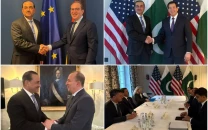From Mumbai to Mohali
The importance of Mohali is that it sucked the venom out of the madness that consumed our two countries since Mumbai.

From Mumbai to Mohali
I know, I know, I cannot denigrate this thing that consumes only a billion-and-a-half people across the subcontinent, and if you count the Indian-Pakistani diaspora across the world, the number could easily touch a cool two billion.
Imagine, if you will, if you can wrench yourself away from the collective euphoria or depression that is washing over each of our countries like a veritable tsunami, the possibilities that this throws open — including for those of us who don’t understand the difference between silly point and third slip. (For the longest time, I thought this was the distance between Yuvraj Singh and Shoaib Akhtar.)
Of course, by the time you read this column, either India or Sri Lanka would have held aloft the World Cup, enough champagne to rival the Arabian Sea that laps the shores of Mumbai would have raced down a thousand gullets, and Nita and Mukesh Ambani would have shed their Mumbai Indian jerseys to don the tricolour and welcome Delhi’s political and social hotties to the city that was witness to that most horrendous of terror attacks in November 2008.
Mumbai will never forget those 62 hours, but the thing about Mohali is that it has, unwittingly, entered the history books. The cricketing heroes of our times, whether Dhoni or Pathan or Riaz, have emerged from the mohallas and galis of India and Pakistan.
The importance of being Mohali is that it has sucked the venom out of the madness that seemed to have consumed our two countries since Mumbai. The pus of mutual animosity that had been simmering within and poisoning the body politic has now burst its bounds. It will take many more matches — cricket, hockey, chess, whatever — for us to behave like normal people, where we bet on the sporting prowess of the boys and girls on the level playing field before us, and not on the all-or-none heroism we tend to bestow upon our respective flags.
Give Mohali a chance to work its magic in the years ahead.
Imagine what transpired in the mind of Prime Minister Manmohan Singh in those 24 hours before he decided he would invite Pakistan’s top leadership to Mohali. It wasn’t as if this was a long-considered decision, where the Cabinet Committee on Security sat back over tea and kaju biscuits and debated the merits of Dhoni’s boys as they encountered Afridi’s men. It wasn’t as if the foreign secretary was asked to weigh in the virtues of the long-suffering composite dialogue process versus the electric excitement that would define D-Day. I doubt the external affairs minster would have been asked for the pros and cons of making such an invitation.
The simple fact is that Manmohan Singh, slowly being dragged under by the notorious scams and frauds being perpetrated by his own honourable ministers, felt it was time to talk to the people of India and Pakistan. At the best of times, the PM is a terrible orator, made worse by the fact that his predecessor Atal Behari Vajpayee had a way of spinning magic with the crowds. But who said that speaking before a mike was the only way of communicating with the people?
The Match was the only answer. The PM saw an opportunity and took it. Even if India had lost, the gamble would have paid off. Mohali wasn’t about Kashmir or terrorism, although we can all bet our last naya paisa that taking the menu forward was discussed over dinner. It was about giving the people of India and Pakistan a glimpse of the ordinary possibilities that lie ahead.
Imagine if Mukesh Ambani, one of the richest men in the world, could buy stakes into Pakistan’s energy resources. Imagine if Punjab’s farmers could work on a common commodities exchange. Imagine if Ardeshir Cowasjee could guest-edit a newspaper in India. Imagine if the Deobandis could travel to meet Maulana Fazlur Rehman on a regular basis.
Mohali’s just given us all another chance. Just imagine if we actually take it.
Published in The Express Tribune, April 4th, 2011.



















COMMENTS
Comments are moderated and generally will be posted if they are on-topic and not abusive.
For more information, please see our Comments FAQ